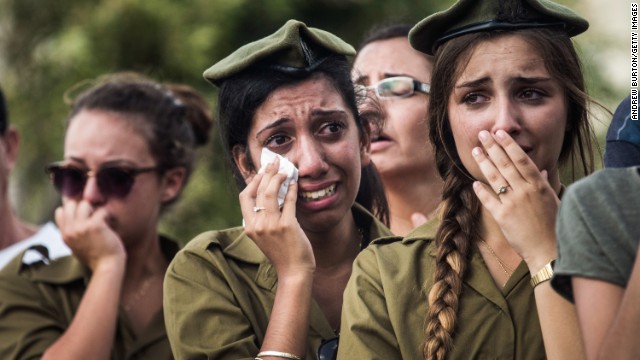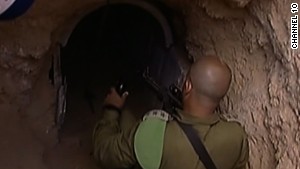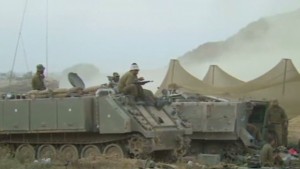Israel finds Hamas are no longer amateur fighters
July 22, 2014 -- Updated 0200 GMT (1000 HKT)
Source: CNN
.
.
How does this incursion compare to previous ones by Israel into Gaza, in terms of military force?
Unlike 2008/09, this
incursion seems to be focused on areas with high concentrations of
people, initially focusing on the Gaza City neighborhood of Shaja'ia. In
'08/09 the focus was on areas where rockets were being fired, which
were typically away from highly populated communities.
And of course at this
stage, it's unclear how many Palestinian casualties there have been in
these locations. The people have been warned by the Israelis to leave
these areas with phone messages, but while many have left, a significant
proportion has stayed behind.
My impression is that
Israel has mobilized a much larger military force than in 2008/09 and in
2012. This is part of the picture of the Israelis going into heavily
populated areas -- which is a much more dangerous operation, as can be seen by the deaths of at least 13 Israeli soldiers on Sunday.
.
Is Israel likely to achieve its objective of destroying the tunnels, and stopping the rocket strikes?
 Israel's ground offensive in Gaza
Israel's ground offensive in Gaza
 Tunnels cause trouble for Israeli forces
Tunnels cause trouble for Israeli forces
 Why Americans are fighting for IDF
Why Americans are fighting for IDF
So far, Israel hasn't
been wildly successful in its stated mission. Since this started, Hamas
has been using tunnels in an attempt to ambush and capture soldiers and
continues to fire rockets at Israel, although the number fired has gone
down. What we see is that as Israel's capabilities have changed, so have
Hamas'. Whenever Israel comes up with new tactics, Hamas and other
factions seem to find new ways to counter them, such as by using
longer-range rockets to fire at Israel, for example.
.
What is significant now
is that Hamas fighters appear to be better trained, with a new set of
skills that I don't think Israel anticipated. One Israeli soldier who
came out of Shaja'ia was quoted in an Israeli publication that Hamas is
fighting like Hezbollah, which waged a successful guerrilla war against
Israel's occupation in the 1980s and 1990s, and inflicted high
casualties on Israeli forces during the 2006 war between Hezbollah and
Israel in Lebanon.
The last serious street
fighting I saw in Gaza was in early 2008, and it was almost like it was
"amateur hour," with fighters in Gaza parading around with their weapons
but not really able to stop the Israeli forces. Now it appears they've
learned they must keep a much lower profile. They've developed what
could be called commando tactics, and are taking full advantage of their
knowledge of their turf.
How long do you believe this incursion will last? How soon before it realistically is better described as a war?
This is now a war, in my
modest opinion -- it's gone beyond a mere incursion. Hamas shows no
sign of backing down, and didn't jump at Egypt's cease-fire proposal.
They want to show that they're a military force to be reckoned with, and
are in it for the long run.
Israel's defense
minister said it would take two or three days to destroy the tunnels. If
this crisis is to end soon, Israel will have to pull back and Hamas
needs to stop firing rockets. In Hamas' opinion, they have achieved one
of their objectives, which is to give Israel a bloody nose.
They claim to have
captured an Israeli soldier -- as yet this is unconfirmed -- but if
true, it would be a huge feather in their cap, in their own terms. When Israeli soldier Gilad Shalit was captured by Hamas
in a June 2006 raid near the Israel-Gaza border, it took five years
before he was freed, in exchange for more than 1,000 Palestinian
prisoners -- so, if true, this will be a huge bargaining chip for Hamas.
Will the death toll already suffered by Israel have a serious impact on public opinion in Israel?
Israelis are used to
this sort of death toll from Hezbollah, but not from Hamas. I was on the
streets of Gaza on Sunday night, when Palestinians celebrated the
claims that an Israeli soldier had been captured.
Shortly afterwards, the
guns on Israeli navy boats opened up. The immediate conclusion of
everyone in the street was that this was Israel's response to the
capture of one of its soldiers.
How much effect
will the pressure/condemnation from the United Nations (and in the
off-mic remarks from U.S. Secretary of State John Kerry) have?
I believe the U.N.
remarks will have no effect in Gaza. There is a perception there that
the U.N. "talks but doesn't walk" -- it's toothless in other words.
Hamas realizes it has few friends in the outside world.
The remarks of the White
House last week though will not go down well in Israel, I believe. And
the comments of John Kerry on Sunday -- which left some wondering
whether he was criticizing Israeli assurances that its ground offensive
in Gaza would be limited -- indicate American patience may be wearing
thin. After one of his deputies mentioned the latest number of
Palestinian casualties, Kerry was heard to say, "It's a hell of a pinpoint operation."
It is estimated that 70% of the more than 500 Palestinians killed in Israel's assault have been civilians.
Washington has tied itself to Israel, and that country's right to
self-defense, therefore the U.S. is going to feel some responsibility.
Americans support Israel rhetorically, but this high Palestinian death
toll is very problematic for the U.S. This is why Kerry may be feeling
uncomfortable -- he spent almost a year trying to forge a Mideast peace
deal, and what's he got to show for it now?

No comments:
Post a Comment